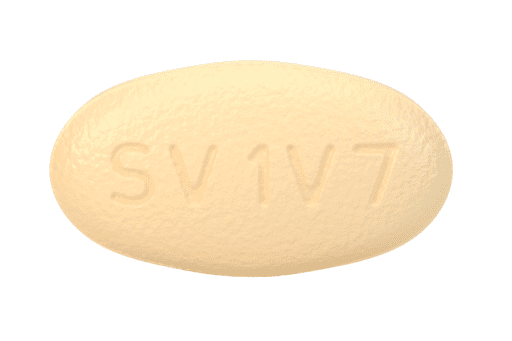Fostemsavir
Generic name: fostemsavir [ fos-TEM-sa-vir ]
Brand name: Rukobia
Dosage form: oral tablet, extended release (600 mg)
Drug class: Miscellaneous antivirals
What is fostemsavir?
Fostemsavir is an antiviral medicine that prevents human immunodeficiency virus (HIV) from multiplying in your body.
Fostemsavir is used with other antiviral drugs to treat HIV, the virus that can cause acquired immunodeficiency syndrome (AIDS). Fostemsavir is not a cure for HIV or AIDS.
Fostemsavir is given after several other HIV medications did not work or have stopped working.
Fostemsavir may also be used for purposes not listed in this medication guide.
Fostemsavir side effects
Get emergency medical help if you have signs of an allergic reaction: hives; difficult breathing; swelling of your face, lips, tongue, or throat.
Fostemsavir may cause serious side effects. Call your doctor at once if you have:
-
fast or pounding heartbeats, fluttering in your chest;
-
shortness of breath; and
-
sudden dizziness (like you might pass out).
Fostemsavir affects your immune system, which may cause certain side effects (even weeks or months after you've taken fostemsavir). Tell your doctor if you have:
-
signs of a new infection--fever, night sweats, swollen glands, cold sores, cough, wheezing, diarrhea, weight loss;
-
trouble speaking or swallowing, problems with balance or eye movement, weakness or prickly feeling; or
-
swelling in your neck or throat (enlarged thyroid), menstrual changes, impotence.
Nausea is the most common side effect of fostemsavir.
This is not a complete list of side effects and others may occur. Call your doctor for medical advice about side effects. You may report side effects to FDA at 1-800-FDA-1088.
Related/similar drugs
Warnings
Follow all directions on your medicine label and package. Tell each of your healthcare providers about all your medical conditions, allergies, and all medicines you use.
Before taking this medicine
You should not use fostemsavir if you are allergic to it.
Many drugs can interact and cause dangerous effects. Some drugs should not be used together with fostemsavir. Your doctor may change your treatment plan if you also use:
-
mitotane;
-
phenytoin;
-
rifampin; or
Tell your doctor if you have ever had liver problems, especially hepatitis B or C.
Tell your doctor if you are pregnant, and use your medications properly to control your infection. HIV can be passed to your baby if the virus is not controlled during pregnancy. Your name may be listed on a registry to track any effects of antiviral medicine on the baby.
Women with HIV or AIDS should not breastfeed a baby. Even if your baby is born without HIV, the virus may be passed to the baby in your breast milk.
Fostemsavir is not approved for use by anyone younger than 18 years old.
How should I take fostemsavir?
Follow all directions on your prescription label and read all medication guides or instruction sheets. Use the medicine exactly as directed.
You may take fostemsavir with or without food.
Swallow the tablet whole and do not crush, chew, or break it.
Use all HIV medications as directed and read all medication guides you receive. Do not change your dose or dosing schedule without your doctor's advice. Every person with HIV should remain under the care of a doctor.
Store at room temperature away from moisture and heat.
It is normal for fostemsavir tablets to smell slightly like vinegar.
Fostemsavir dosing information
Usual Adult Dose for HIV Infection:
600 mg orally twice a day
Use: In combination with other antiretroviral agent(s), for the treatment of HIV-1 infection in heavily treatment-experienced patients with multidrug-resistant HIV-1 infection failing their current antiretroviral regimen due to resistance, intolerance, or safety considerations
What happens if I miss a dose?
Take the medicine as soon as you can, but skip the missed dose if it is almost time for your next dose. Do not take two doses at one time.
Try not to miss any doses. Get your prescription refilled before you run out of medicine completely.
What happens if I overdose?
Seek emergency medical attention or call the Poison Help line at 1-800-222-1222.
What should I avoid while taking fostemsavir?
If you have hepatitis B or C, using fostemsavir can cause new or worsening liver problems. You may need frequent liver function tests while using fostemsavir and for several months after you stop.
Do not stop using any medication you take to treat hepatitis, unless your doctor tells you to.
What other drugs will affect fostemsavir?
Fostemsavir can cause a serious heart problem. Your risk may be higher if you also use certain other medicines for infections, asthma, heart problems, high blood pressure, depression, mental illness, cancer, malaria, or HIV.
Tell your doctor if you take birth control pills or hormone replacement therapy that contains ethinyl estradiol. Fostemsavir can increase your blood levels of ethinyl estradiol, which may increase side effects of this medicine.
When you start or stop taking fostemsavir, your doctor may need to adjust the doses of any "statin" cholesterol medicine you take on a regular basis. This includes atorvastatin, lovastatin, pravastatin, rosuvastatin, simvastatin, Crestor, Vytorin, Zocor, and others.
Other drugs may affect fostemsavir, including prescription and over-the-counter medicines, vitamins, and herbal products. Tell your doctor about all your current medicines and any medicine you start or stop using.
More about fostemsavir
- Check interactions
- Compare alternatives
- Side effects
- Dosage information
- During pregnancy
- Drug class: miscellaneous antivirals
- Breastfeeding
- En español
Patient resources
Other brands
Professional resources
Other brands
Related treatment guides
Further information
Remember, keep this and all other medicines out of the reach of children, never share your medicines with others, and use this medication only for the indication prescribed.
Always consult your healthcare provider to ensure the information displayed on this page applies to your personal circumstances.
Copyright 1996-2025 Cerner Multum, Inc. Version: 1.01.

